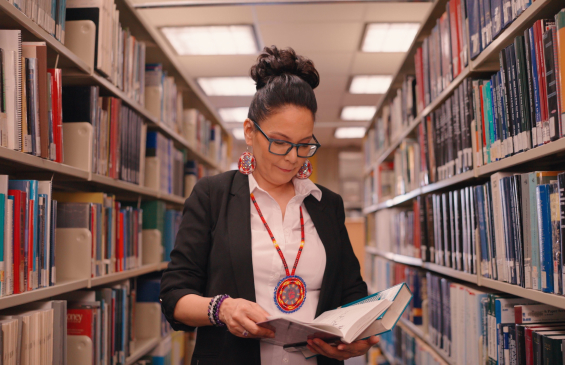How Indigenous-Centred Curriculum is Helping Learners Broaden Career Horizons

June 21, 2024
When Gabrielle McMann began her journey at Toronto Metropolitan University as a journalism student, she soon realized that her academic writing skills needed a boost to reach her educational goals.
“I kept getting the same feedback from all of my teachers, which was that my grammar and punctuation just wasn’t cutting it,” says Gabby, who is from the Mississaugas of the Credit First Nation. “I never really had a teacher that sat down with me and taught me the proper rules of punctuation and grammar.”
With the support of the Indigenous Foundations Program at The Chang School, she found the resources and guidance that helped her build confidence and academic success in her studies.
“The Indigenous Foundations Program is really what gave me the space to ask those questions and to accommodate for my personal needs as a student,” she says. “I’ve noticed a huge shift in my abilities and confidence as a writer. I just approached journalism and all writing in general with my cultural and traditional knowledge and approach.”
The Indigenous Foundations Program is a partnership between TMU’s Gdoo-maawnjidimi Mompii Indigenous Student Services (mentioned above) and Spanning the Gaps. The program is designed for Indigenous learners like Gabby, who seek to broaden their opportunities toward academic success. It was produced with the specific needs of Indigenous communities in mind, incorporating Indigenous history and knowledge, and traditional understandings.

Gabrielle McMann typing on her laptop on campus
When Bernice Legarde came to the Indigenous Foundations Program at The Chang School in 2018, she had a clear vision: earn an undergraduate degree. With no prior experience in post-secondary education, the program helped to enhance Bernice’s academic writing and critical-thinking skills along with the supportive guidance needed to thrive in an undergraduate program.
“One of my main problems was essay writing. I didn’t know how to write an essay. Essays really intimidated me,” says Bernice, who is Oji-Cree from Thunder Bay and Bear Clan and whose spirit name is Silver Hummingbird Woman. “As a result of the program, I now get 80s and 90s in my essays. I do an essay with complete confidence – no nervousness, no stress about writing essays anymore.”
Now, after completing the Indigenous Foundations Program as part of Spanning the Gaps at The Chang School, Bernice is earning a Bachelor of Social Work and is well on her way to achieving her dream.
“All the staff there are so helpful, very kind. The fact that it was Indigenous-led was very important to me as well,” she says. “This program catapulted me into the academic world. The program itself was all-encompassing.”
Incorporating Indigenous Knowledge and Perspectives
Indigenous adults pursuing post-secondary education have improved over the past decade, particularly among Indigenous women like Gabby and Bernice. Almost half (49.2 percent) of Indigenous adults had completed a post-secondary education in 2021 compared to just over 70 percent for non-Indigenous Canadians, according to a Statistics Canada report. “Lack of culturally relevant curricula” was cited as one of the main barriers to post-secondary education.
The Chang School incorporates Indigenous knowledge and perspectives into the curriculum. In addition to the Indigenous Foundations Program, the award-winning Certificate in Indigenous Knowledges and Experiences aims to create positive, meaningful change for Indigenous Peoples by educating learners about Indigenous health and well-being, governance, literature, community relations, and land use in Canada and how to engage with community agencies and organizations.
Initiatives and Programs Supporting Indigenous Learners
TMU and The Chang School support Indigenous students in higher education through merit-based awards, Indigenous student counselling, Indigenous career mentoring program, and culture centres. Gdoo-maawnjidimi Mompii (meaning “we gather here”) Indigenous Student Services offers culturally supportive programs and initiatives to First Nations, Inuit and Métis students at TMU, ensuring access to specialized services that strike a balance between academic excellence and traditional teachings and culture.
Moving Forward
In June, Canada recognizes National Indigenous History Month, which provides an opportunity to learn about the unique cultures, traditions, and experiences of First Nations, Inuit, and Métis. June 21 is National Indigenous Peoples Day, in which the rich histories, heritage, and resilience of Indigenous Peoples in Canada are celebrated.
Canada’s post-secondary institutions must remain committed to developing and executing strategies to improve support for Indigenous learners and communities to encourage more participation in future. This includes participation from non-Indigenous students, faculty, and administration in fostering an inclusive and respectful learning environment.
